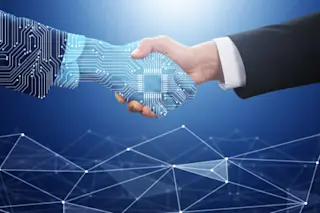Tablets and touchscreen smartphones make it feel like we're living in the future. But they're the technology of the present. So what should be anticipating for the future of interfaces? Bret Victor has a solid grip on interface design. And he has a beef with touchscreens as the archetype of the Interface of the Future. He argues that poking at and sliding around pictures under glass is not really the greatest way to do things. Why? Because that just uses a finger! Victor is a fan of hands. They can grab, twist, flick, feel, manipulate, and hold things. Hands get two thumbs up from Victor. As a result, Victor argues that any interface that neglects hands neglects human beings. Tools of the future need to be hand-friendly and take advantage of the wonderful functions hands can perform. His entire article, "A Brief Rant on the Future of Interfaces" is a ...
Think It To Do It: The Problem With Touchscreens---and Hands
Explore the future of interfaces beyond touchscreens, focusing on hands and the potential of neuro-computer interfaces.
More on Discover
Stay Curious
SubscribeTo The Magazine
Save up to 40% off the cover price when you subscribe to Discover magazine.
Subscribe












